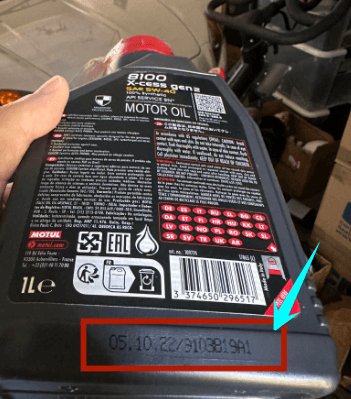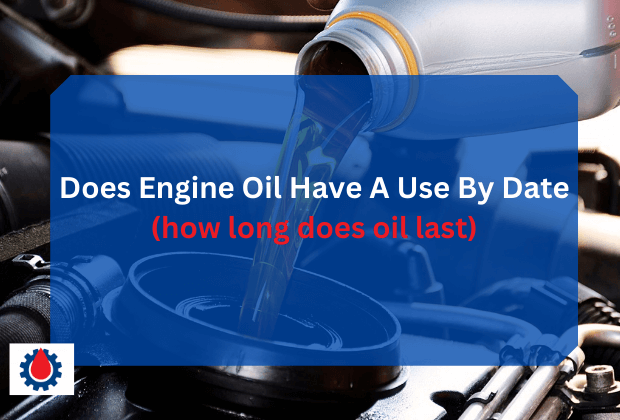Does engine oil have a use-by date? Can it expire, or is it safe to use indefinitely? In this post, we’ll explore the lifespan of engine oil, the factors affecting its shelf life, and tips on how to store it properly to maximize its effectiveness.

Does Engine Oil Have A Use By Date
Yes, engine oil does expire. While it doesn’t have a strict “use-by” date like perishable food items, it does degrade over time. Most engine oil manufacturers recommend using the oil within 5 years of production if stored properly.
After this period, the oil may lose its effectiveness, leading to poor engine performance and potential damage.
How Long Does Engine Oil Last?
The lifespan of engine oil depends on various factors, including:
- Type of Oil
- Conventional (Mineral) Oil: Typically lasts 3–5 years when stored correctly.
- Synthetic Oil: This can last up to 7–8 years due to its refined composition and added stabilizers.
- Storage Conditions
- Engine oil should be stored in a cool, dry place away from direct sunlight and extreme temperatures.
- If stored in a garage with fluctuating temperatures, the oil may degrade faster.
- Sealed vs. Opened Containers
- Sealed bottles can last several years without significant degradation.
- Opened bottles are exposed to moisture and contaminants, reducing their lifespan significantly.
Read Check Engine Light After Oil Change(8 Causes & Fixes)
How to Check If Engine Oil Has Expired
Even if your engine oil is within the recommended timeframe, it’s crucial to check for signs of degradation before using it:
1. Change in Color
- Fresh oil is typically clear and golden.
- Expired oil may turn darker or cloudy, indicating contamination or oxidation.
2. Thick or Sludgy Consistency
- Good engine oil should flow smoothly.
- If it appears thick, clumpy, or sludgy, it’s time to replace it.
3. Unusual Smell
- If the oil has a rancid or burnt odor, it may have degraded due to oxidation.
4. Presence of Sediments or Separation
- If you notice sediment or oil separation, the additives may have broken down, making the oil ineffective.
Read Car Engine Oil Color Chart(Color That Signals Immediate Danger)
What Happens If You Use Expired Engine Oil?
Using old or degraded engine oil can lead to several issues, including:
- Reduced Lubrication: The oil loses its ability to reduce friction, leading to increased wear and tear on engine components.
- Engine Sludge Formation: Expired oil may break down and form sludge, clogging vital engine parts.
- Poor Fuel Efficiency: Old oil can increase engine resistance, reducing fuel efficiency.
- Increased Engine Temperature: Degraded oil cannot effectively dissipate heat, leading to overheating.
Proper Storage Tips to Extend Engine Oil Life
To maximize the lifespan of your engine oil, follow these storage tips:
- Store in a Cool, Dry Place: Keep the oil at a temperature between 40°F and 85°F (4°C and 30°C).
- Keep the Bottle Sealed: Once opened, use the oil within 6-12 months.
- Avoid Direct Sunlight: UV rays can degrade the oil’s additives over time.
- Use Original Containers: Avoid transferring oil to other containers, as they may introduce contaminants.
Read Normal Oil Pressure for Diesel Engines(Norma Pressure Range)
Does Used Engine Oil Have an Expiration Date?
Yes, used engine oil breaks down faster due to exposure to heat, combustion byproducts, and contaminants. Used oil should be changed according to the manufacturer’s recommendations, typically every 3,000–10,000 miles depending on the vehicle and oil type.
FAQs
Does engine oil have an expiration date?
Yes, engine oil has a shelf life. While it doesn’t have a strict expiration date like food, most manufacturers recommend using it within 5 years if stored properly. Over time, the oil’s additives break down, reducing its effectiveness.
Can I use 10-year-old engine oil?
Using 10-year-old engine oil is not recommended. Even if the oil appears fine, its chemical composition may have degraded, leading to poor lubrication, increased friction, and potential engine damage. If the oil is that old, it’s best to dispose of it properly and use fresh oil.
Read Engine Oil for Guns(Why Gun Owners Are Switching to Engine Oil)
Can I use 3-year-old engine oil?
Yes, you can use 3-year-old engine oil if it has been stored properly—in a sealed container, away from direct sunlight, and in a cool, dry place. However, always check for signs of degradation like color changes, thickening, or separation before using it.
How can I tell if my oil is still good?
You can check your oil’s condition by looking for these signs:
- Color: Fresh oil is golden, while degraded oil may appear dark, cloudy, or sludgy.
- Texture: If the oil is thick, clumpy, or has visible sediment, it’s likely expired.
- Smell: A burnt or rancid odor indicates oxidation and degradation.
- Separation: If the oil has separated into layers, its additives have likely broken down.
How to check engine oil expiry date?
Most engine oil containers do not have a printed expiration date. However, you can check:
- The manufacturing date (if printed) assumes a lifespan of about 5 years.
- The batch code on the bottle some manufacturers provide expiry details based on the batch code on the bottle.
- The condition of the oil using the signs mentioned above.
How many years does engine oil last?
- Unopened synthetic oil: 7–8 years (if stored properly).
- Unopened conventional oil: 3–5 years.
- Opened oil: Should be used within 6–12 months.
Read How Does Triax Engine Repair Oil Work(Save Your Engine and Wallet)
Final Thoughts
Storing it properly and checking for signs of expiration can help ensure your engine stays well-lubricated and runs smoothly. When in doubt, replace old oil to avoid potential engine damage.




